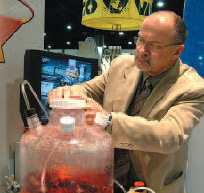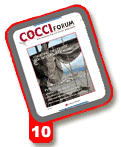COCCI News
Product updates and industry trends
A new web site providing an informative source of information
about maintaining intestinal health in poultry
has been launched by Schering-Plough Animal Health.
The site, www.intestinalhealthpoultry.com, provides visitors
with an overview of the challenges facing poultry producers
"specifically public concern about food safety and
the problems with traditional coccidiosis control programs.
It offers solutions from Schering-Plough Animal Health
and emphasizes the company's commitment to helping
producers meet demand for drug-free food production by
improved management of intestinal health.
With sections in English and Spanish, the web site also
provides an overview of Schering-Plough Animal Health's
coccidiosis vaccines, as well as SprayCox administration
equipment and the growth promoter, Enradin.
In time, visitors will also be able to access past issue of
CocciForum magazine, as well as relevant key Technical
Service Bulletins.
AirMix Technology Debuts in Atlanta
 Townsend at the International Poultry Expo with the clear
jug and new AirMix technology available for the SprayCox
spray cabinet. |
Schering-Plough Animal Health's new AirMix technology
for keeping coccidiosis vaccine oocysts in suspension
during spray vaccination was unveiled at the International
Poultry Expo in Atlanta.
"The response has been very positive," says company
engineer Paul Townsend. "Basically, the first thing they
notice is that you can actually see the vaccine in the bottle.
You can see it being mixed "and that's a real positive.
With the old system, the only way you could really tell if it
was mixing was to remove the lid and looking down inside.
So this makes it real foolproof. That's really the goal behind
going to a system like this."
Upgrading existing SprayCox spray cabinets to AirMix
technology is quick and easy. It's just a matter of changing
out the container and putting on a new pump to supply air
to the bottle, which plugs into the machine.
Townsend says the presence of air does not increase the
chance for vaccine contamination. "We have a filter in the
line to clean the air before it gets into the bottle," he
explains. "We left nothing to chance."
Challenge work was conducted by Dr. Steve Fitz-Coy, a
technical service rep for the company known worldwide for
his expertise in coccidiosis. AirMix will be available in the
US this spring and in other markets later this year.
Proper Handling of Vaccine Essential for Good Results
Proper vaccine handling is crucial to obtain the best
results with live oocyst vaccines such as Paracox and
Coccivac, cautions Dr. Charlie Broussard, worldwide technical
services director, Schering-Plough Animal Health.
The oocysts in the vaccine are sensitive to environmental
temperature. The vaccine should be maintained between
+2° C and +8° C (36°- 47° F) throughout shipping, storage
and subsequent transport to farm or hatchery, Broussard
says.
"Watch out for uneven temperatures in a refrigerator that
could result in partial freezing of the product, especially if
it's kept near the top, bottom or back of the unit," he says.
"Even if you see just a few ice crystals in the liquid, toss
the vial. Even partial freezing can destroy enough of the
oocysts to impair vaccine efficacy," Broussard adds.
Danish Authorities OK Paracox™-5 After Rigorous Testing
Schering-Plough Animal Health has secured regulatory
approval to sell its coccidiosis vaccine for broilers,
Paracox™-5, in Denmark.
Even though Paracox™-5 has been registered throughout the
EU since 2000 and despite significant sales in many of the markets,
the vaccine could not be sold in
Denmark because of testing requirements and
problems unique to that country, explains
Rod Watson, regional senior director for
Europe and the Middle East, Schering-Plough
Animal Health
Denmark has a national screening and
eradication program for Newcastle disease
virus (NDV) that involves in vivo testing for
extraneous agents. The test, however, takes
several months to complete, beyond the shelf
life of Paracox™-5.
Even though all Paracox vaccines are produced
in disease-free birds in a GMP plant in
an NDV-free country, and even though every single batch is
tested for extraneous agents, Danish authorities wanted to
abide by the rules of their own program, says Watson.
In addition, if testing according to the Danish program
turned up a false positive, then supplies of Paracox™-5 could
have been delayed throughout Europe, he says.










